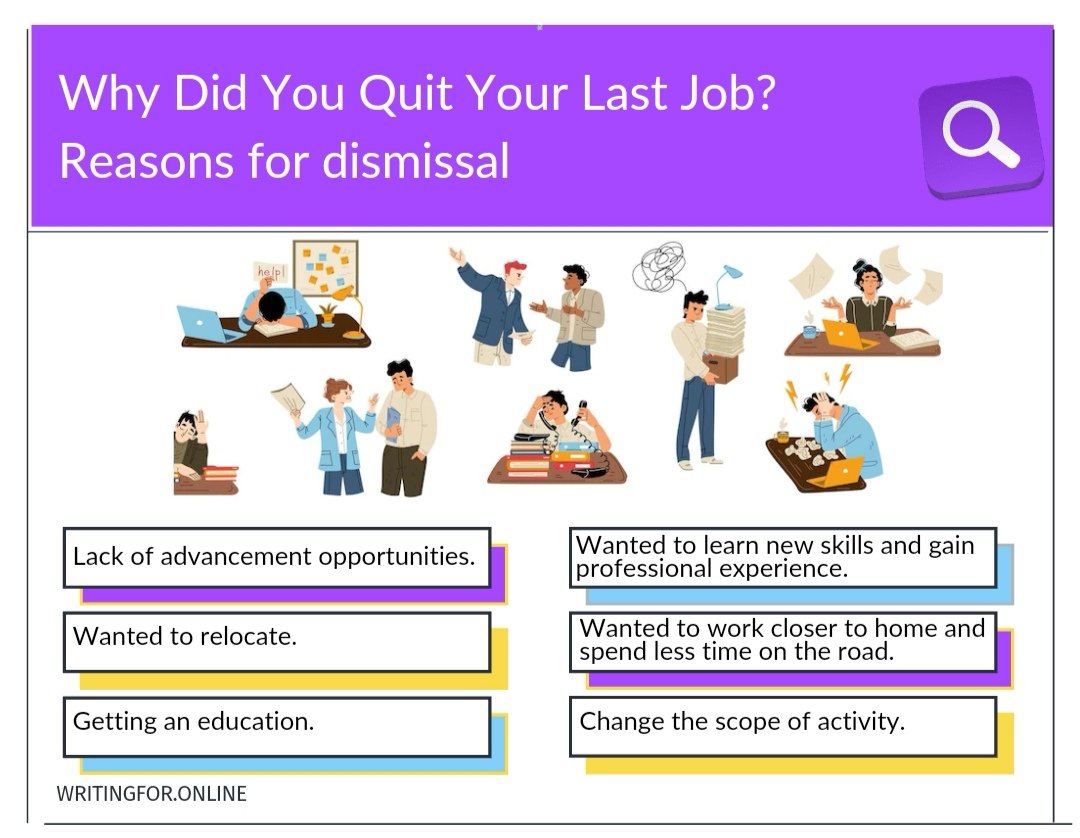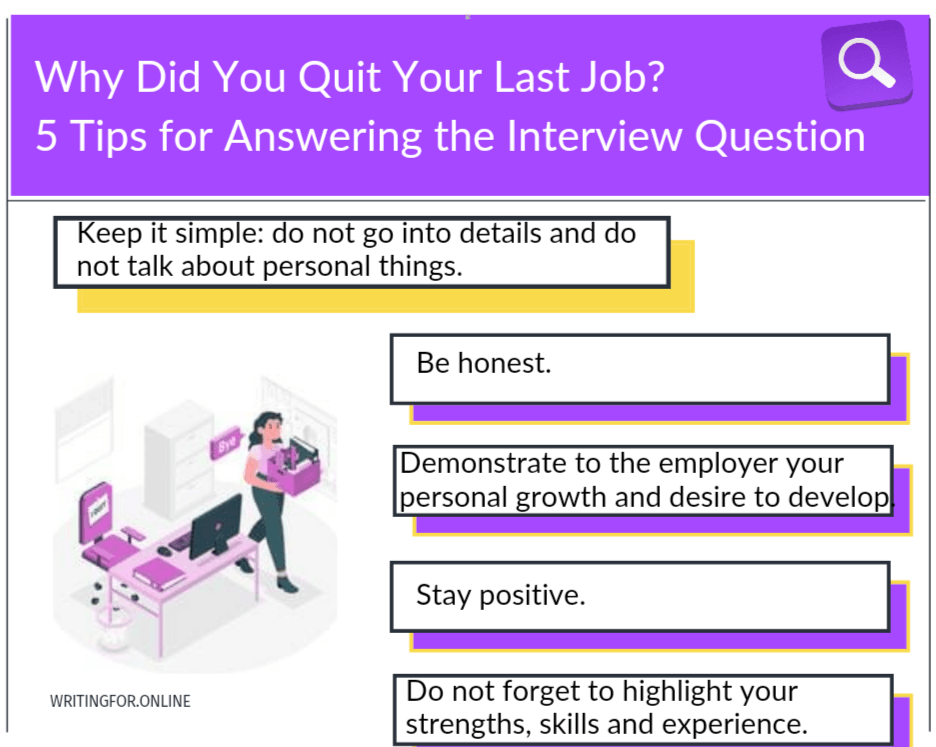“Why did you quit your last job?” This question is one of the ten most popular and frequently asked interview questions. It may sound different:
- “Why did you decide to change your job?”
- “Why are you looking for a new job?”
- “Why were you fired?”
The question “Why did you leave your last job? ” is popular among interviewers. So there is a high chance that you will have to answer it.
So that the question does not surprise you, you need to prepare the answer in advance. You need to give an honest answer that will reflect your specific circumstances, but it must sound positive.
Now is not the time to tell the interviewer what a terrible boss you had and how much you hated your last job.
Read posts:
“How to Prepare for a Job Interview in 8 Steps.”
“How to Pass A Job Interview Successfully: 17 Tips”.
Why Does an Employer Ask “Why Did You Quit Your Last Job?”
Actually, this question lets the interviewer know a lot about you, such as:
- you quit your last job or you got fired;
- about the reasons for your dismissal;
- have a good relationship with your previous employer and colleagues or not.
Your answer will help the employer understand how you can behave in the workplace, what kind of character you have, and what are your values and professional goals.
“Why Did You Quit Your Last Job?”: the Reasons for Dismissal That You Can Talk About at the Job Interview
The reason for leaving your previous job should be “positive”, for example, related to your desire to move up the career ladder.

Here are some simple, but most common and successful explanations for leaving a previous job:
- Getting an education.
- Moving to another district, city, state, or country.
- Сhange the scope of activity.
- Want to develop some professional skills.
- The desire to learn new skills and gain professional experience.
- The desire to take on more/less responsibility.
- The company reorganized, so job responsibilities changed.
- I want to work closer to home and spend less time on the road.
Read post “What Is a Career, Career Growth and Professional Promotion: Meaning, Differences.”
Statistics: Why Are Americans Leaving Their Jobs?
According to a statistical survey, in 2022, Americans quit their jobs for the following reasons:
- Low pay.
- Lack of advancement opportunities.
- Feel disrespected.
- Lack of child care.
- Lack of schedule flexibility.
- Lack of benefits.
- Wanted to relocate.
- Too many work hours.
- Too few work hours.
- Covid-19 vaccine required.
Read post “How to Tell Your Boss You Are Leaving: What to Say, Examples.”
How to Correctly Answer the Interview Question “Why Did You Leave Your Previous Job?”
When you answer the interview question about the reasons for your dismissal, be forward-thinking. In addition to the brief explanation of “moved to another city”, try to go further and develop the idea:
“What I like in your company is that, unlike the previous job, the position of marketing analyst involves not only studying sales markets but also …”
Take the opportunity and demonstrate to the employer your interest in the company and your motivation in getting a position. You can tell how the corporate culture, values, and the company’s focus are close to you, and why it matches your career plans, matches your work experience, skills, and strengths.
Do not talk disparagingly or negatively about your previous job. Focus on presenting yourself as a suitable candidate for the vacant position.
If you quit because of a conflict with your boss and speak negatively about him, then the potential employer will think that you will do the same with him if you decide to quit again: you will tell everyone what a terrible boss you have. No one wants to ruin their reputation, and your interviewer is no exception.
Express enthusiasm and a desire to gain new work experience and learn new skills. Focus on your strengths and achievements. Convince the potential employer that you are a professional and worthy candidate for the vacant position.
10 Sample Answers to the Interview Question “Why Did You Quit Your Last Job?”
Answer #1
“To be honest, I was not going to change jobs, but a friend told me about a vacancy. I am interested in the position and, in general, the company. What you offer to your employees sounds intriguing and promising, and the vacancy itself suits me perfectly and matches my work experience and qualifications.”
Such an answer, of course, flatters the employer, but not to overdo it with praise and compliments. The main thing is to emphasize that this particular vacancy brought you to the labor market.
Answer #2
“The firm has fallen on hard times and the employer has had to lay off most of its employees. I also got laid off. So now I am looking for a new job.”
The answer is truthful and based on facts, but it is devoid of negativity and excessive emotionality.
Answer #3
“I decided it is time to work in my profession. It is time to consolidate the acquired knowledge and master new skills. I want to develop in this direction and become an expert in my field.”
The employer will appreciate your enthusiasm and your desire to develop.
Answer #4
“I quit my previous job to spend more time with my father and take care of him. But now circumstances have changed. I am ready to go back to work. This is exactly what I need right now.”
Although you should not be overly frank and share personal during the interview. This is the case when such an explanation is quite appropriate and acceptable.
Answer #5
“I quit in order to find a job closer to home. After all, every day I had to spend about 3 hours on the road.”
Answer #6
“My boss, with whom we have worked together for over 15 years, has retired. I decided that now is the right time for a change – time to move on.”
Answer #7
“At the previous place of work, there were no opportunities for further career growth.”
Answer #8
“After working for the company for two years, I realized I needed something different. I want to work in a company where teamwork is valued.”
Answer #9
“The vacant position meets my needs and my professional experience and skills. In my last job, unfortunately, I could not use my full potential.”
Answer #10
“I liked my previous job, but, unfortunately, I could not even dream of any career growth. The company is small and has a narrow specialization.”
What to Say If You Were Fired?
First, in any case, your answer must be positive. Do not criticize or blame your former employer or yourself.
Second, briefly describe the reason for the dismissal and continue the conversation.
One of the possible answers is:
“I needed a job. I got this position, but I did not fully figure out if it was right for me.
After two and half months, I was finally convinced that the manager and I have completely different views on what is included in my daily work. We could not reach an agreement, and I got fired at the end of the trial period.
Now I ask the employer to tell me exactly what will be included in my job duties and evaluate whether this job is suitable for me or not.
So, before our interview, I studied all the information that I could find about your company. I am sure that my skills fully meet your requirements, and this job is exactly what I need.”
Read also posts:
Why Do You Want to Work in Our Company: 5+ Sample Answers to the Interview Question.
“Tell Me About Yourself”: How to Introduce Yourself in a Job Interview, Sample Answers.
Why Should We Hire You: 7 Best Answers to the Interview Question.
10 Tough Job Interview Questions and Sample Answers.
5 Tips for Answering the Interview Question “Why Did You Quit Your Last Job”

Let’s highlight the five recommendations that you need to follow when answering a question about your dismissal from your previous job:
- Be honest.
- Keep it simple: do not go into details and do not talk about personal things.
- Stay positive.
- Demonstrate to the employer your personal growth and desire to develop.
- Do not forget to highlight your strengths, skills, and experience.
Good luck!
P. S.: Did you like this post? Please, share it with your friends, thank you! Have a nice day!